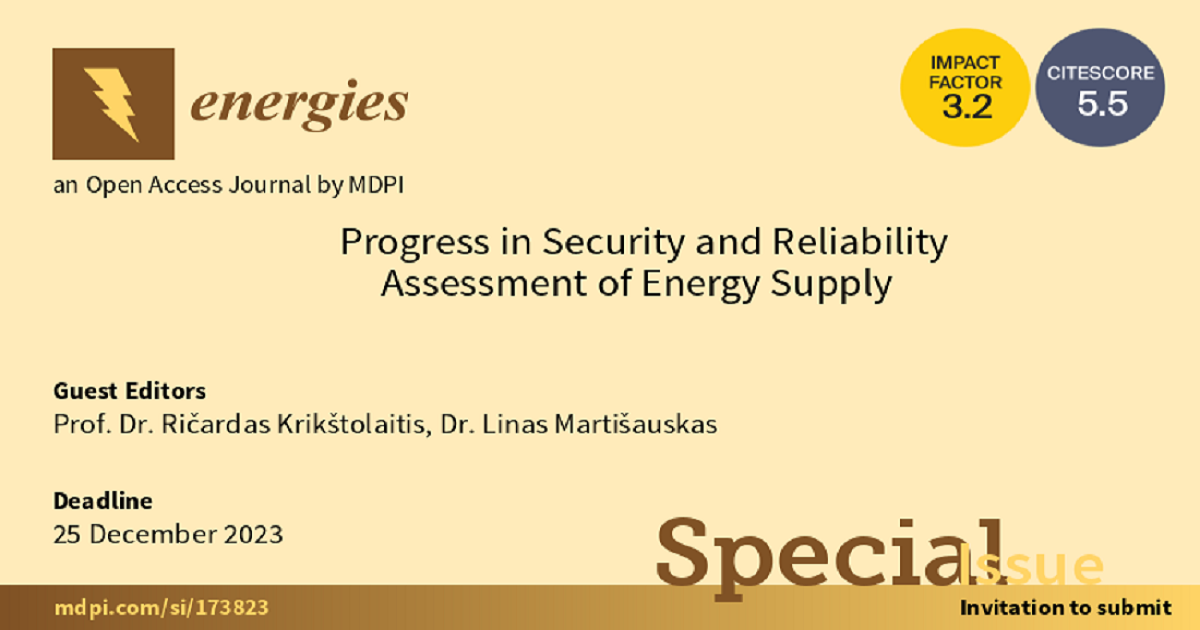Progress in Security and Reliability Assessment of Energy Supply
A special issue of Energies (ISSN 1996-1073). This special issue belongs to the section "C: Energy Economics and Policy".
Deadline for manuscript submissions: closed (25 December 2023) | Viewed by 1203

Special Issue Editors
Interests: data analytics; energy security; risk and reliability analysis
Special Issues, Collections and Topics in MDPI journals
2. Department of Mathematics and Statistics, Faculty of Informatics, Vytautas Magnus University, Universiteto g. 10, Kaunas District, LT-53361 Akademija, Lithuania
Interests: data analytics; energy security analysis; energy system mathematical modelling; sustainable energy; reliability and risk analysis
Special Issues, Collections and Topics in MDPI journals
Special Issue Information
Dear Colleagues,
Energy security remains an important issue in today’s world. The importance of energy security is growing with the dependence of states on energy resources and the increasing competition for access to these sources. This Special Issue aims to collect research manuscripts that demonstrate high-quality methodological or practical approaches to assessing the security and reliability assessment of energy supply.
Prof. Dr. Ričardas Krikštolaitis
Dr. Linas Martišauskas
Guest Editors
Manuscript Submission Information
Manuscripts should be submitted online at www.mdpi.com by registering and logging in to this website. Once you are registered, click here to go to the submission form. Manuscripts can be submitted until the deadline. All submissions that pass pre-check are peer-reviewed. Accepted papers will be published continuously in the journal (as soon as accepted) and will be listed together on the special issue website. Research articles, review articles as well as short communications are invited. For planned papers, a title and short abstract (about 100 words) can be sent to the Editorial Office for announcement on this website.
Submitted manuscripts should not have been published previously, nor be under consideration for publication elsewhere (except conference proceedings papers). All manuscripts are thoroughly refereed through a single-blind peer-review process. A guide for authors and other relevant information for submission of manuscripts is available on the Instructions for Authors page. Energies is an international peer-reviewed open access semimonthly journal published by MDPI.
Please visit the Instructions for Authors page before submitting a manuscript. The Article Processing Charge (APC) for publication in this open access journal is 2600 CHF (Swiss Francs). Submitted papers should be well formatted and use good English. Authors may use MDPI's English editing service prior to publication or during author revisions.
Keywords
- energy supply security
- energy system reliability
- energy system modelling
- energy planning
Benefits of Publishing in a Special Issue
- Ease of navigation: Grouping papers by topic helps scholars navigate broad scope journals more efficiently.
- Greater discoverability: Special Issues support the reach and impact of scientific research. Articles in Special Issues are more discoverable and cited more frequently.
- Expansion of research network: Special Issues facilitate connections among authors, fostering scientific collaborations.
- External promotion: Articles in Special Issues are often promoted through the journal's social media, increasing their visibility.
- e-Book format: Special Issues with more than 10 articles can be published as dedicated e-books, ensuring wide and rapid dissemination.
Further information on MDPI's Special Issue polices can be found here.






